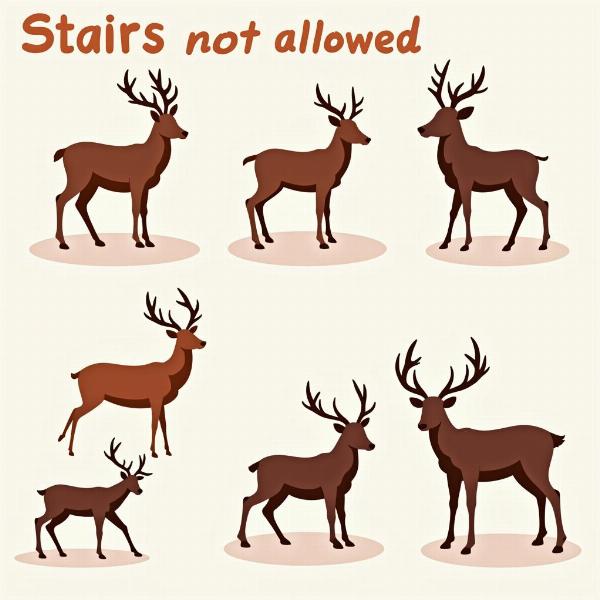Understanding the phrase “stags not allowed” within the Indian context requires a nuanced appreciation of Hindi language and cultural norms. While a direct translation might simply be “पुरुषों का प्रवेश निषेध” (purushon ka pravesh nishedh – men’s entry prohibited), the meaning and implications can vary significantly based on the specific situation. This guide delves into the cultural context, linguistic nuances, and practical implications of this phrase.
Decoding “Stags Not Allowed” in Various Indian Settings
The phrase “stags not allowed” is frequently encountered across various social settings in India, often carrying implications beyond a simple gender restriction. Let’s explore some common scenarios:
- Weddings and Celebrations: In many Indian weddings and other celebratory events, “stags not allowed” can signify a preference for couples or families. This is often rooted in the belief that the presence of single men might disrupt the festive atmosphere or make female guests uncomfortable.
- Nightclubs and Bars: Some establishments might implement a “stags not allowed” policy to maintain a specific ambiance, often aiming for a more balanced gender ratio or to curb potential unruly behavior.
- Housing Societies and Residential Areas: In certain residential communities, this restriction could stem from concerns about security or maintaining a family-friendly environment.
- Religious Places: While less common, some religious sites might restrict entry to single men during specific rituals or ceremonies, often due to traditional customs or beliefs.
Linguistic Nuances and Alternative Phrases
While “पुरुषों का प्रवेश निषेध” serves as a direct translation, other phrases can convey similar meanings with varying degrees of formality and cultural sensitivity. These include:
- केवल युगल/परिवार (Kewal Yugal/Parivaar): This translates to “Couples/Families only,” a more polite and contextually appropriate alternative.
- एकल पुरुषों का प्रवेश निषेध (Ekal Purushon ka Pravesh Nishidh): This means “Single men’s entry prohibited,” offering a more specific restriction.
Why the Restriction? Addressing Societal Concerns
The “stags not allowed” policy, although sometimes viewed as discriminatory, often arises from genuine societal concerns. These can range from maintaining decorum at social gatherings to ensuring the safety and comfort of women in public spaces. Understanding these underlying reasons can help navigate these situations with greater cultural sensitivity.
Navigating “Stags Not Allowed” Situations
Encountering a “stags not allowed” situation can be awkward. Here are some practical tips:
- Inquire Politely: If unsure, respectfully inquire about the policy’s rationale.
- Respect the Decision: Even if you disagree, respect the establishment’s or host’s decision.
- Consider Alternatives: Look for alternative venues or events that welcome single men.
Expert Insights: Understanding the Cultural Context
Dr. Anjali Sharma, a sociologist specializing in Indian cultural practices, explains, “The ‘stags not allowed’ policy, while seemingly restrictive, often stems from deeply ingrained cultural values regarding social harmony and gender roles. Understanding this context is crucial for navigating such situations respectfully.”
Similarly, Mr. Rohan Verma, a cultural consultant, adds, “While modernizing trends are challenging some of these traditional norms, the ‘stags not allowed’ practice continues to reflect societal anxieties surrounding safety and decorum in certain social settings.”
 Stags Not Allowed Sign
Stags Not Allowed Sign
Conclusion: Respecting Cultural Norms and Finding Alternatives
“Stags not allowed” is more than just a literal phrase; it represents a complex interplay of cultural norms and societal concerns within the Indian context. While the policy can be perceived as discriminatory, understanding its underlying rationale allows for navigating such situations with greater cultural sensitivity and finding suitable alternatives. Ultimately, respectful communication and awareness are key to navigating these social nuances.
FAQ
- What does “stags not allowed” mean in Hindi? It generally translates to “पुरुषों का प्रवेश निषेध” (purushon ka pravesh nishedh), meaning men’s entry prohibited, but carries further cultural implications.
- Is “stags not allowed” discriminatory? While it can be perceived as such, it often arises from genuine societal concerns about safety and decorum.
- What should I do if I encounter this restriction? Inquire politely about the reason and respect the decision. Explore alternative options if necessary.
- Why is this policy common in India? It reflects deeply ingrained cultural values related to social harmony and gender roles.
- Are there alternative phrases in Hindi? Yes, phrases like “केवल युगल/परिवार” (Couples/Families only) are more contextually appropriate.
- Is this practice changing? Modernizing trends are influencing these norms, but the practice persists in some settings.
- Where is this restriction most commonly seen? Weddings, nightclubs, residential areas, and occasionally religious places.
Meaning-Hindi.in offers expert translation services specializing in accurately conveying the nuances of Hindi language and culture. Our expertise spans various domains, including legal, technical, business, and website localization. We understand the subtleties of phrases like “stags not allowed” and ensure culturally sensitive translations for your specific needs. Contact us for professional Hindi translation services at email: [email protected] or phone: +91 11-4502-7584. Meaning-Hindi.in is your trusted partner for bridging the language gap.